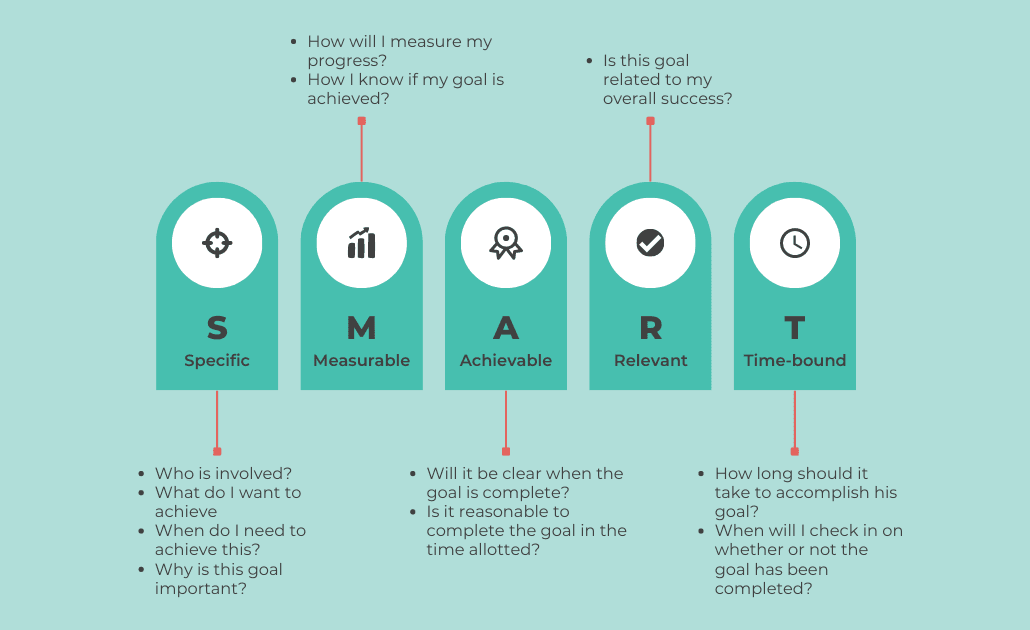
In an industry notorious for its high stress and burnout rates, a proactive approach to wellness is crucial for maintaining a sustainable work-life balance.
Part of that involves setting wellness goals. But whether your aspirations revolve around getting more sleep, getting your diet in check, or joining a gym, the fact remains that dreaming up a goal is the easy part. Actually sticking to it? That’s a different story.
Why do so many people fail to achieve their goals? What’s really holding you back from living your best life? And what can you do as a busy veterinary professional to maximize your chances of hitting your health and wellbeing goals?
In this blog post, we’ve rounded up the five most common obstacles getting in the way of your health and wellbeing goals.
Your goals are vague

When you don’t know your destination, it’s difficult to know where to start.
Let’s say you wake up one morning feeling inspired and declare to the world, “I’m going to get fitter,” or “I want to be happier.”
They’re admirable goals, sure, but they both suffer from a severe lack of specificity.
After all, how do you define “fitter”? What does “happier” actually mean? How will you track your progress? And, most importantly, how will you know when you’ve achieved the goal?
Clarity is key. If you don’t have a clear vision of what it is you want to achieve, it’s going to be very difficult to know what to focus on, what to prioritize, and the right steps to take to reach the desired outcome. Without clear metrics or benchmarks to measure, it’s challenging to know if you’re making progress, which can quickly sap your motivation.
Solution
The answer here is simple: Be specific. Get granular and define what you want to achieve, the steps you’re going to take to achieve it, and when you want to achieve it.
The SMART framework is a good starting point for setting goals. It suggests that goals should be:
- Specific: The what, why, and how of the goal. The more detailed you are, the easier it is to take action.
- Measurable: The criteria you’ll track to measure progress. Measurable goals provide a way to assess and celebrate milestones along the way.
- Achievable: It’s good to be ambitious, but aim too high and you risk getting overwhelmed. Consider your personal circumstances and be realistic.
- Relevant: Keep your goals meaningful and aligned with your values. If it’s not relevant to your wider aspirations, there’s less motivation to follow through.
- Time-bound: Set a timeframe. Giving yourself a deadline encourages you to prioritize and helps you avoid procrastination.
2. You feel guilty about “wasting” time on self-care

A career in veterinary medicine often involves a certain level of self-sacrifice.
Attending to the wellbeing of patients and the concerns of clients tends to take priority over just about everything else, which means all the other ingredients that go into making a full, balanced life sometimes get neglected.
Self-care is often one of the first things to go. When you’re juggling urgent priorities - the outcomes of which can literally mean the difference between life and death - making time for yourself can start to feel like an indulgence.
Solution
Self-care is not selfish. It’s self-preservation. By dedicating time to self-care, you set healthy boundaries that enable you to recharge, recover, and show up as your best self for your patients. You deserve it, and so do the animals you serve.
Effective time management is key to making self-care a priority so try to set aside non-negotiable moments for self-care in your schedule.
If there are legitimately not enough hours in the day, cut down on the time commitment required to reach your goals. Don’t have time for an hour-long walk? Make it a 30-minute stroll. Struggling to meal prep for the whole week? Start with a couple of days and work up from there. Reducing the time commitment boosts consistency, which in turn increases your chances of hitting your goals.
3. You’re trying to do it all on your own

Setting yourself a goal sometimes feels like a very intimate undertaking.
You’ve taken the time to look inward, admitted that there's some deficiency in your life you need to work on, and then made a deal with yourself to work on said deficiency. It’s a personal, confidential matter - so why would you get anyone else involved?
In reality, relying exclusively on self-accountability is a common cause of goal failure. When you don’t have a support system or an external party to hold you accountable, it’s easy to fall into a pattern of self-sabotage.
Without external expectations, you might get too lenient on yourself and start rationalizing counterproductive behavior. We’re talking procrastination, excuses, lack of motivation - all the things that are kryptonite to accomplishing your goals.
A lack of external accountability also means a lack of objective feedback. When you’re only looking at the world through your own eyes, it can be tricky to accurately assess your own progress. Results can get lost in a fog of self-criticism and you might miss those little (but motivating!) incremental milestones that go into achieving a goal.
Solution
Research indicates that, for the vast majority of people, external accountability increases the chances of staying committed to a goal.
So, don’t keep your aspirations to yourself. Build your team. Develop your support network.
Share your goals with trusted colleagues, friends, or mentors who can provide support and hold you accountable. Consider forming an accountability group or finding a wellbeing buddy within the veterinary community and don’t be afraid to reach out for support when you need ideas, encouragement, or a pep talk.
4. You rely excessively on motivation

You know that fired up feeling you get when you first set a goal? That’s motivation. It’s the initial spark of energy that propels you forward; that feeling that nothing could possibly stop you from achieving your goals.
Motivation plays a crucial role in sustaining efforts towards health and wellbeing goals - but it doesn’t last forever. It fluctuates. The rhythms of your personal circumstances - emotions, mindset, values, stressors, and so on - influence motivation intensity. When motivation wanes, minor setbacks seemingly swell to unassailable catastrophes, tempting you to abandon your goals prematurely.
Solution
The solution here is to avoid leaning exclusively on motivation and learn to embrace discipline.
Motivation and discipline are complementary forces. Motivation is the jolt of enthusiasm that gets you to start pursuing a goal, while it’s discipline that sustains the effort and drives consistent progress - even when you don’t feel inspired. Discipline ensures steady action, self-control, and perseverance in the face of challenges, bridging the gap between intention and results.
By harnessing both motivation and discipline, you can enhance their chances of success and achieve your health and wellbeing goals more effectively.
5. You have too many goals

Drink more water. Stretch daily. Journal. Go to therapy. Establish a night routine. Manage stress levels. Commit to a meditation practice. Get more sleep.
All those things fall under the wellbeing umbrella, along with a thousand other positive habits that shape how you feel and function.
When you start your wellbeing journey, it’s easy to get carried away and try to work on everything at once, but that typically doesn’t work out well in the long run.
Why? Well, while having multiple goals isn’t necessarily a bad thing, having too many goals makes it difficult to prioritize. It becomes challenging to know where to allocate your time and energy, diluting your efforts and slowing your overall progress.
Solution
As a veterinary professional, you’ve probably mastered the art of multitasking. However, when it comes to goal setting, less is often more.
Recognize that you only have a limited amount of time. You can’t do everything, so focus on a couple of key goals, work with purpose, and focus on making meaningful progress. Those other goals aren’t going anywhere - you can always move onto them when you finish the projects you’re currently working on.
Takeaway
Health and wellbeing goals are important for living a balanced life. While achieving those goals can be challenging, understanding the factors that contribute to failure can help you navigate your journey more effectively. By setting specific goals, dedicating time to self-care, focusing your efforts, assembling a support network, and embracing discipline, you can increase your chances of achieving long-term health and wellbeing success.
Remember, setbacks are normal, and the journey is a process of continuous learning and growth. Good luck!
Need more mindfulness in your life? Check out Mindful May, an ezyVet initiative dedicated to promoting wellbeing and self-care in the veterinary industry.